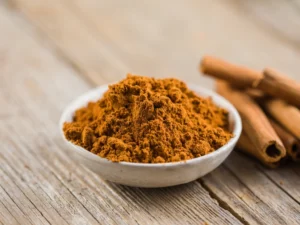Enjoy the delightful Cinnamon Walnut Dream Delight, a simple yet satisfying pre-bed sweet treat that supports your health goals. Greek yogurt, a staple of the Greek diet, adds a touch of heritage to this simple recipe. Let’s explore how you can enhance this product with readily available ingredients from your kitchen. It’s important to be mindful of the ingredient quantities. Nuts provide numerous nutritional benefits and are calorie-dense, so exercise caution if you’re conscious of your weight.
Savor the creamy and low-fat Greek yogurt as the foundation of this delightful treat, rich in protein. The gentle sweetness of honey complements the warming flavor of Ceylon cinnamon, known for its potential benefits in regulating glucose levels. Topped with crunchy walnuts, this combination offers a satisfying texture.
Ingredients:
- 150grams plain low-fat Greek yogurt (no added sugar)
- 10g honey
- 1/2 teaspoon Ceylon cinnamon
- 15g walnuts, chopped

Rich in antioxidants and containing compounds such as cinnamaldehyde, Ceylon cinnamon has been associated with potential anti-inflammatory, antidiabetic, and antimicrobial properties.
Method:
- In a small bowl, add the plain low-fat Greek yogurt.
- Drizzle the honey over the yogurt and sprinkle the Ceylon cinnamon on top.
- Mix well until the honey and cinnamon are evenly distributed throughout the yogurt.
- Sprinkle the chopped walnuts over the yogurt mixture.
- Gently stir the walnuts into the yogurt, leaving some on top for added texture.
- Serve and enjoy your heart-healthy pre-bed sweet treat!
Nutritional facts:
- Calories: ~237 kcal
- Protein: ~16g
- Carbohydrates: ~18g
- Fat: ~11g
Heart-Healthy Benefits:
- Plain, low-fat Greek yogurt is an excellent source of protein, which aids in muscle repair and growth. It also contains calcium, potassium, and probiotics that promote heart health and support a healthy digestive system.
- Honey, when consumed in moderation, provides natural sweetness and contains antioxidants antibacterial and anti-inflammatory properties.
- Ceylon cinnamon is known for its antioxidant and anti-inflammatory properties. It may help lower blood sugar levels and improve insulin sensitivity, thus supporting heart health and blood sugar control.
- Walnuts are rich in omega-3 fatty acids, linked to numerous heart health benefits. They may help reduce inflammation, lower cholesterol levels, and support cardiovascular well-being.
Enjoy your Cinnamon Walnut Dream Delight as a satisfying dessert that satiates your sweet tooth and nourishes your heart with wholesome ingredients. Sleep well, knowing you’ve indulged in a health-conscious treat that supports your overall well-being.


